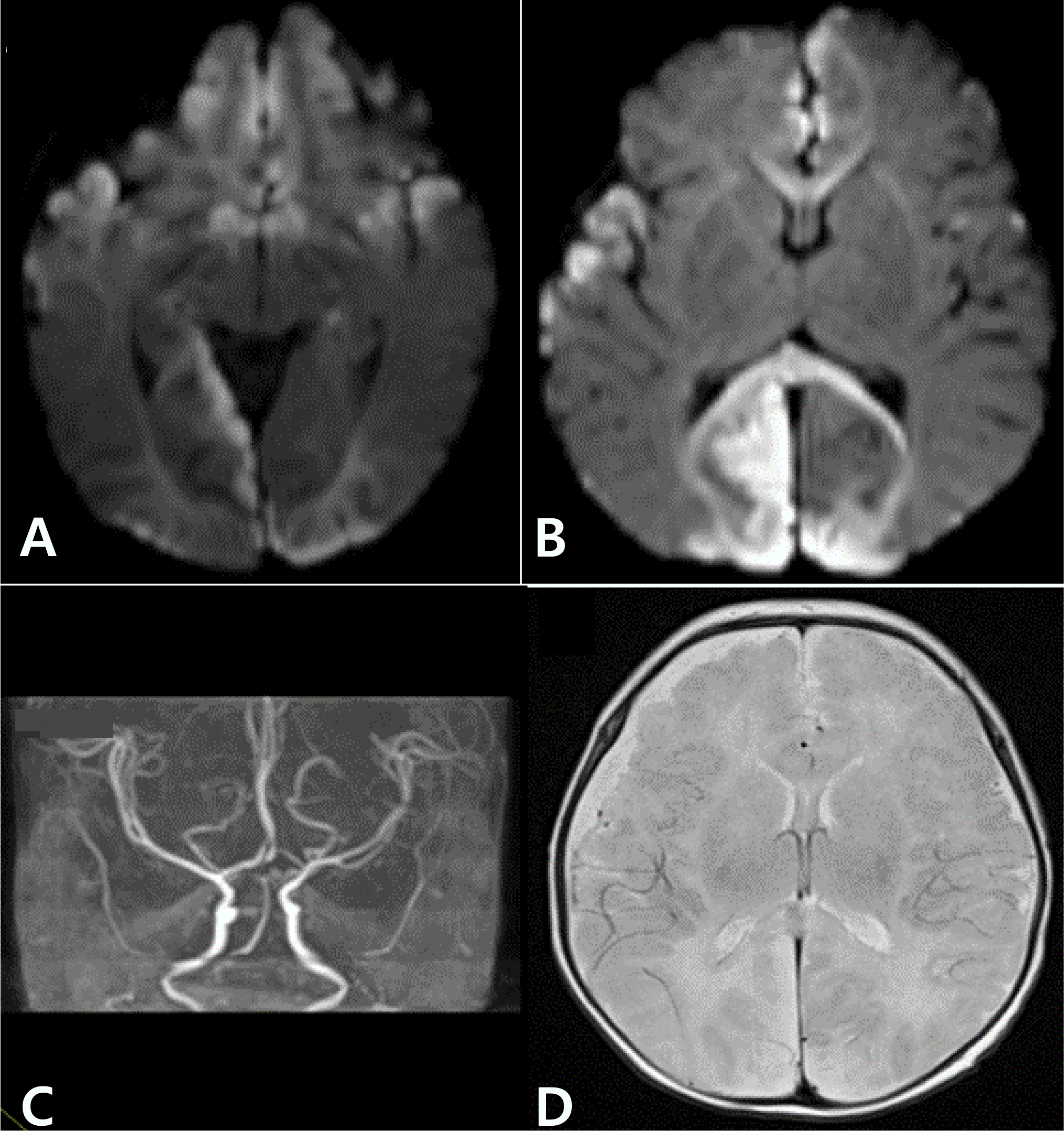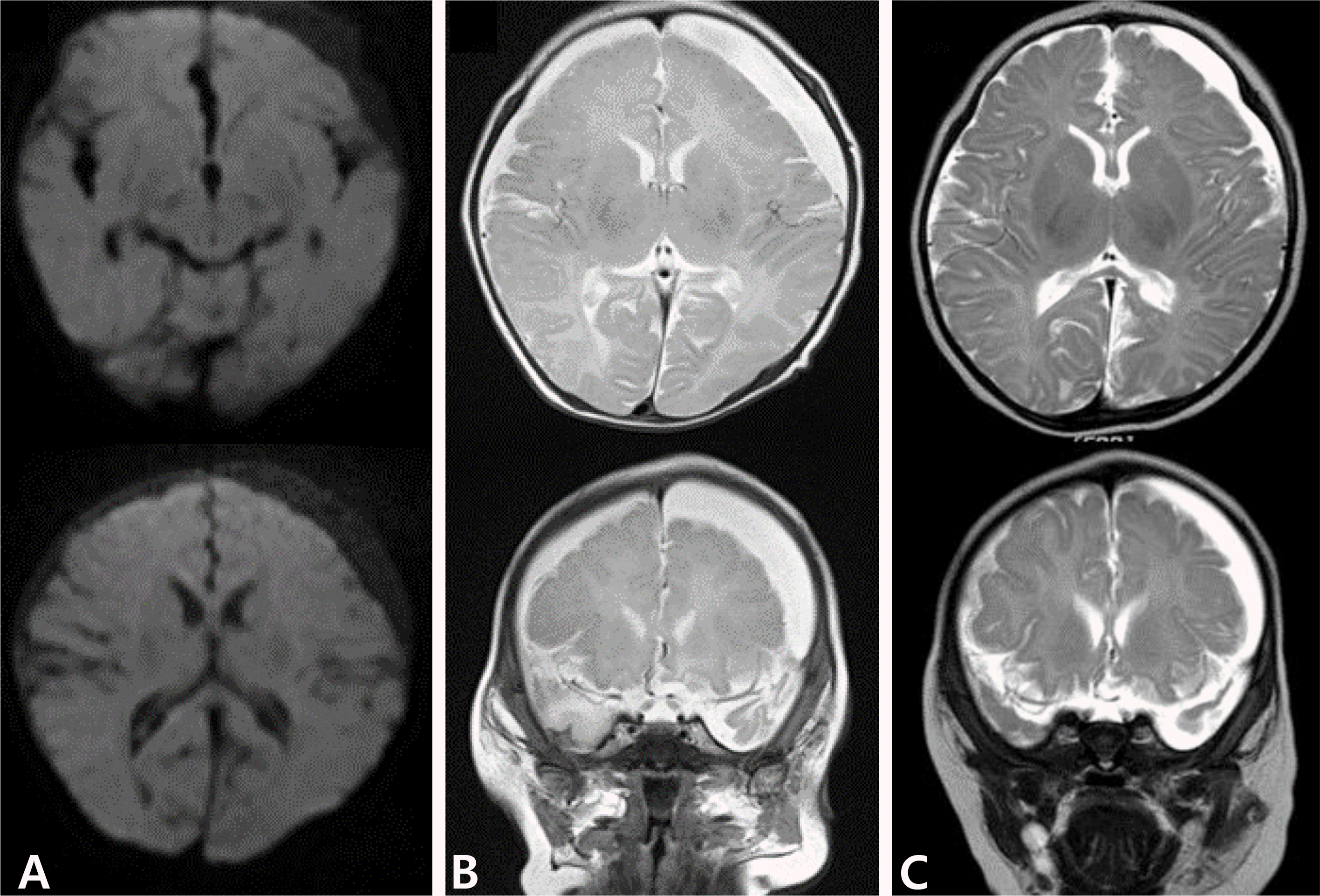Abstract
Group B streptococcus (GBS) is the leading cause of neonatal morbidity and mortality. Late-onset GBS disease commonly manifests as occult bacteremia or meningitis. Approximately 50% of survivors of late-onset meningitis have long-term neurologic sequelae. Cerebrovascular complications are often associated with unfavorable clinical outcomes of GBS meningitis. There have been a few reports of cerebral infarction accompanied by GBS meningitis. We report a 29-day-old girl with severe, widespread cerebral infarction due to late-onset GBS meningitis. Isolated GBS strain from this patient was serotype III, ST-19. Currently, she has cortical blindness and significant developmental delay.
Go to : 
References
1. Pannaraj PS, Baker CJ. Group B streptococcal infections. Cherry JD, Demmler-Harrison GJ, Kaplan SL, Steinbach WJ, Hotez PJ, editors. editors.Feigin and Cherry's Textbook of pediatric infectious diseases. 7th Ed.Philadelphia: Saunders Elsevier;2014. p. 1153–69.

2. Lachenauer CS, Wessels MR. Group B streptococcus. Kliegman RM, Nelson WE, editors. editors.Nelson textbook of pediatrics. 20th Ed.Philadelphia: Elsevier;2016. p. 1337–41.

3. Hernandez MI, Sandoval CC, Tapia JL, Mesa T, Escobar R, Huete I, et al. Stroke patterns in neonatal group B streptococcal meningitis. Pediatr Neurol. 2011; 44:282–8.
4. deVeber GA, Kirton A, Booth FA, Yager JY, Wirrell EC, Wood E, et al. Epidemiology and outcomes of arterial ischemic stroke in children: the Canadian Pediatric Ischemic Stroke Registry. Pediatr Neurol. 2017; 69:58–70.

5. Pryde K, Walker WT, Hollingsworth C, Haywood P, Baird J, Hussey M, et al. Stroke in paediatric pneumococcal meningitis: a cross-sectional population-based study. Arch Dis Child. 2013; 98:647–9.

6. Lehman LL, Rivkin MJ. Perinatal arterial ischemic stroke: presentation, risk factors, evaluation, and outcome. Pediatr Neurol. 2014; 51:760–8.

7. Cho HK, Nam HN, Cho HJ, Son DW, Cho YK, Seo YH, et al. Serotype distribution of invasive group B streptococcal diseases in infants at two university hospitals in Korea. Pediatr Infect Vaccine. 2017; 24:79–86.

8. Jones N, Bohnsack JF, Takahashi S, Oliver KA, Chan MS, Kunst F, et al. Multilocus sequence typing system for group B streptococcus. J Clin Microbiol. 2003; 41:2530–6.

9. Pintye J, Saltzman B, Wolf E, Crowell CS. Risk factors for late-onset group B streptococcal disease before and after implementation of universal screening and intrapartum antibiotic prophylaxis. J Pediatric Infect Dis Soc. 2016; 5:431–8.

10. Cho HK, Lee H, Kang JH, Kim KN, Kim DS, Kim YK, et al. The causative organisms of bacterial meningitis in Korean children in 1996–2005. J Korean Med Sci. 2010; 25:895–9.

11. Chong Y, Lee K, Kwon OH, Nahm CH, Murai T, Inazumi Y. Trend of isolation and serotypes of group B streptococci in Korea. Yonsei Med J. 1993; 34:78–83.

12. Uh Y, Jang IH, Yoon KJ, Lee CH, Kwon JY, Kim MC. Colonization rates and serotypes of group B streptococci isolated from pregnant women in a Korean tertiary hospital. Eur J Clin Microbiol Infect Dis. 1997; 16:753–6.

13. Hong JS, Choi CW, Park KU, Kim SN, Lee HJ, Lee HR, et al. Genital group B Streptococcus carrier rate and serotype distribution in Korean pregnant women: implications for group B streptococcal disease in Korean neonates. J Perinat Med. 2010; 38:373–7.

14. Lee BK, Song YR, Kim MY, Yang JH, Shin JH, Seo YS, et al. Epidemiology of group B streptococcus in Korean pregnant women. Epidemiol Infect. 2010; 138:292–8.

15. Park KH, Kim KH, Kang JH, Kim KN, Kim DS, Kim YK, et al. Current status and clinical presentations of invasive neonatal Group B streptococcal infections in Korea. Pediatr Int. 2011; 53:236–9.

16. Tibussek D, Sinclair A, Yau I, Teatero S, Fittipaldi N, Richardson SE, et al. Late-onset group B streptococcal meningitis has cerebrovascular complications. J Pediatr. 2015; 166:1187–92.e1.

17. Chang CJ, Chang WN, Huang LT, Chang YC, Huang SC, Hung PL, et al. Cerebral infarction in perinatal and childhood bacterial meningitis. QJM. 2003; 96:755–62.

18. Tazi A, Disson O, Bellais S, Bouaboud A, Dmytruk N, Dramsi S, et al. The surface protein HvgA mediates group B streptococcus hypervirulence and meningeal tropism in neonates. J Exp Med. 2010; 207:2313–22.

Go to : 
 | Fig. 1.Magnetic resonance image and angiography performed on the 4th hospital day showed (A, B) multifocal diffusion restriction at cortex of cerebral hemisphere and corpus callosum, (C) suspicious multifocal stenosis, and (D) extra-axial fluid collection at bilateral cerebral convexity. |
 | Fig. 2.(A) Magnetic resonance image (MRI) on the 24th hospital day showed no more diffusion restriction, (B) but increased in amount of extra-axial fluid collection at left cerebral convexity. (C) One month later, follow-up MRI showed decreased in amount of extra-axial fluid collection. |
Table 1.
The Result of Antimicrobial Susceptibility Test of Streptococcus agalactiae Isolated from the Patient




 PDF
PDF ePub
ePub Citation
Citation Print
Print


 XML Download
XML Download